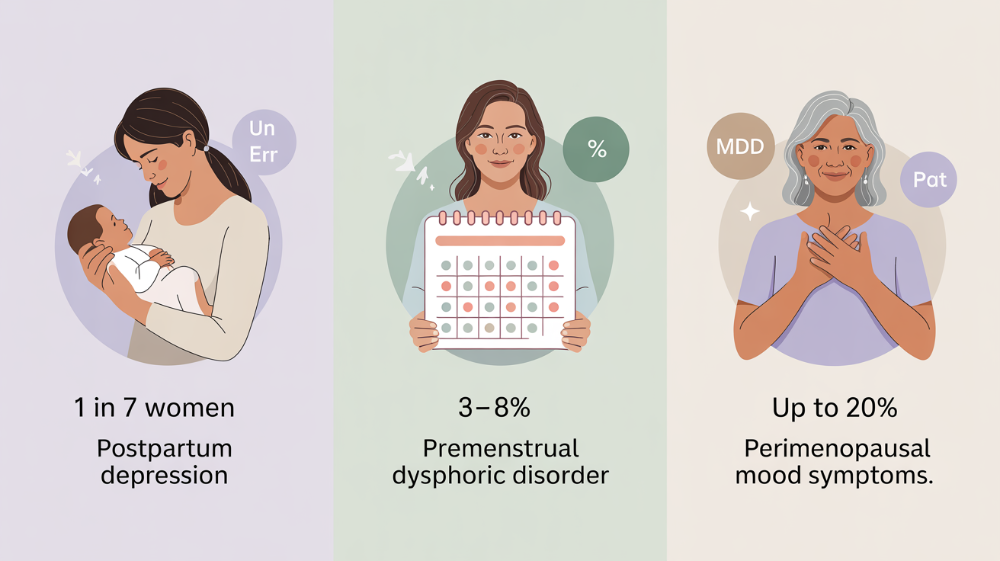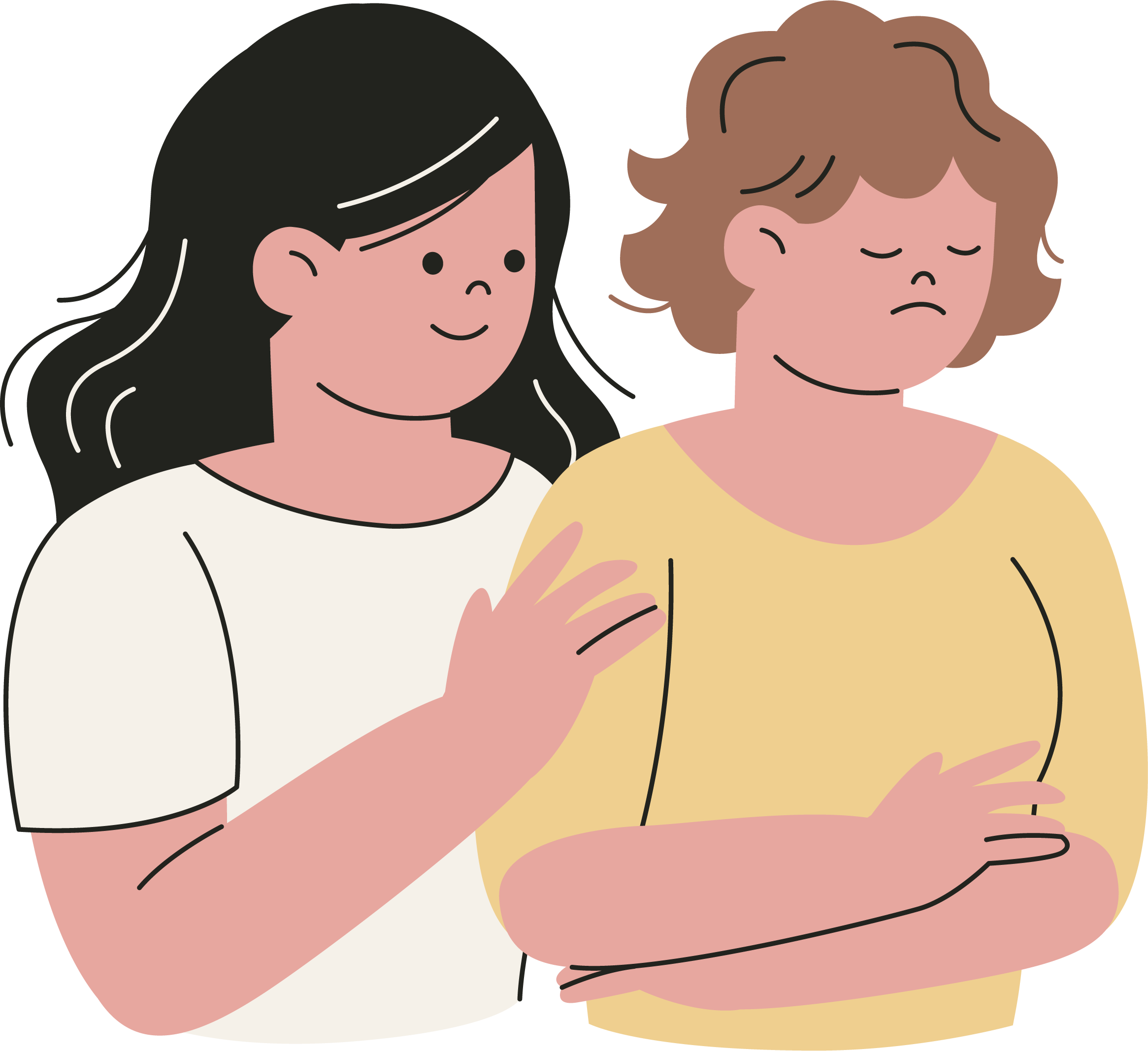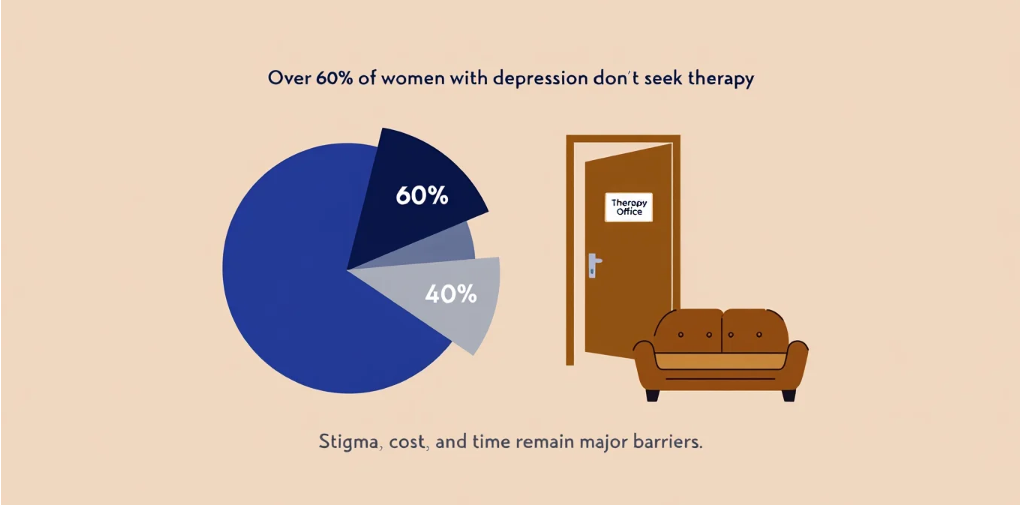Depression doesn’t look the same for everyone — and for women, it often comes with a complex web of emotional, biological, and societal factors.
Whether it’s related to hormone shifts, caregiving expectations, or the constant pressure to juggle work and family, many women find themselves silently struggling. In a place like Berkeley — known for its progressive values and mental health awareness — access to skilled, compassionate care can be life-changing.
Dr. Lynn Winsten, a highly respected psychologist in Berkeley, understands that women’s experiences with depression are deeply personal and multifaceted. Her practice focuses on helping women of all ages understand what they’re going through and build healthier, more empowered lives.
In this article, we’ll explore what makes depression in women unique, how hormonal changes shape mental health, and how therapy — especially in the hands of a trusted provider like Dr. Winsten — can be a key to lasting relief and self-understanding.
The Unique Emotional Landscape of Women Facing Depression
Depression in women often shows up differently than it does in men — not just in symptoms, but in the root causes. Women are statistically more likely to experience depression, and the reasons are more than just hormonal.
Social conditioning, caregiving roles, trauma history, and societal expectations all contribute to this mental health disparity.
Many women in Berkeley, like elsewhere, shoulder dual or triple roles: professionals, mothers, partners, daughters. They’re expected to be nurturers and achievers, often without adequate support or acknowledgment.
This kind of emotional labor can become overwhelming, especially when women internalize guilt or believe they must “hold it all together.”
There’s also a deeply gendered aspect to how depression is diagnosed and perceived. While men may externalize symptoms through irritability or substance use, women tend to internalize — experiencing sadness, fatigue, self-doubt, and a profound sense of isolation.
Unfortunately, these symptoms are sometimes dismissed as “moodiness” or “stress,” leading to delayed or inadequate care.
For many women, past trauma is also a silent contributor. From childhood emotional neglect to adult experiences with emotional or physical abuse, unresolved trauma can take root and subtly drive depressive symptoms for years. Dr. Lynn Winsten emphasizes the importance of trauma-informed care in her Berkeley therapy practice, helping clients untangle these buried experiences so healing can begin.

Hormones and Mental Health: Understanding the Biological Connection
It’s impossible to talk about women’s mental health without addressing the powerful role of hormones. From the onset of menstruation to the transition through menopause, hormonal fluctuations can influence mood, energy, sleep, and overall mental clarity.
Pregnancy and Postpartum Depression:
During pregnancy, a woman’s body experiences intense hormonal shifts that can affect neurotransmitters in the brain. For some, these changes spark increased vulnerability to depression. After childbirth, the sudden drop in estrogen and progesterone can trigger postpartum depression — a serious and often misunderstood condition.
In a supportive therapy setting like the one Dr. Lynn Winsten offers in Berkeley, new mothers can find both validation and practical coping tools during this sensitive time.
Premenstrual Dysphoric Disorder (PMDD):
More than just “PMS,” PMDD is a severe form of premenstrual distress that includes mood swings, depression, and anxiety. It affects daily life and often goes undiagnosed.
Therapy can be instrumental in managing PMDD by helping women track their emotional patterns and develop techniques for self-care and boundary-setting.
Perimenopause and Menopause:
This life stage, which can last for years, is marked by irregular hormone levels that can cause mood swings, irritability, sleep disturbances, and depression. Many women in their 40s and 50s come to therapy feeling like they’re “losing themselves.” Dr. Winsten often works with women during this time to normalize their experiences and help them redefine their identities beyond the roles they’ve carried for decades.
By combining talk therapy with practical lifestyle strategies and medical referrals when necessary, therapy helps women feel more in control of their mental health — rather than at the mercy of their biology.

How Therapy Helps Women in Berkeley Navigate Depression
Depression therapy is not a one-size-fits-all process — especially for women, who often need space to explore not only symptoms but the complex life context behind them. In Berkeley, where holistic care is widely embraced, therapists like Dr. Lynn Winsten offer individualized approaches that consider the whole person.
Cognitive Behavioral Therapy (CBT):
CBT helps clients identify and challenge negative thought patterns that fuel depression. Women struggling with self-criticism or perfectionism — often learned through years of societal conditioning — can begin to shift their internal dialogue and build more self-compassionate habits.
Psychodynamic Therapy:
This approach explores how past experiences and relationships shape current emotional struggles. For women with unresolved childhood trauma, complicated family dynamics, or recurring relationship patterns, this deeper dive can be transformative. Dr. Winsten uses these insights to help clients connect the dots and regain a sense of agency.
Trauma-Informed Therapy:
A significant portion of women experiencing depression have also experienced trauma. Whether it’s childhood neglect, intimate partner violence, or sexual assault, these experiences often go unspoken. Dr. Winsten’s compassionate, non-judgmental approach allows women to safely process these memories and release the shame that often accompanies them.
Support for Identity and Role Transitions:
Many women face turning points that shake their sense of self — becoming a parent, ending a relationship, or reentering the workforce. Therapy helps them navigate these transitions, rediscover their values, and build a life aligned with what truly matters to them.
Berkeley’s culturally conscious therapy landscape makes it possible for women to access care that aligns with their unique needs and identities. Dr. Winsten, in particular, is known for her thoughtful, inclusive approach and her commitment to meeting women exactly where they are.
Learn more about Dr. Lynn Winsten’s therapy services in Berkeley
Coping Strategies that Support Mental Wellness
While therapy lays the foundation for healing, the day-to-day work of managing depression often happens outside the therapy room. Women facing depression benefit greatly from structured coping strategies — and in a community like Berkeley, many of these practices are readily accessible and culturally supported.
-
Mindfulness and Meditation help women stay grounded during emotional overwhelm. Dr. Winsten incorporates these into her practice to promote emotional awareness.
-
Journaling encourages self-reflection and helps clients track progress or patterns between sessions.
-
Social Support through friends, family, or group therapy is essential to combat loneliness and create connection.
-
Physical Activity — even light movement — can alleviate symptoms. Berkeley offers scenic opportunities for this, from local hikes to yoga studios.
-
Boundary-Setting helps women prioritize their own needs and conserve emotional energy, particularly in high-stress environments.
Therapists like Dr. Winsten guide clients in discovering which strategies feel authentic and sustainable.
Explore more ways to cope with depression
Managing Stress, Motherhood, and Career Pressures
For many women, depression doesn’t look like lying in bed — it looks like pushing through. It means performing well at work, caring for others, and smiling through exhaustion. This version of high-functioning depression is especially common among women balancing careers, families, and personal goals.
Berkeley women often feel pressure to be “superwomen.” The city’s ambitious, high-achieving culture can intensify perfectionism and burnout. Therapy with someone like Dr. Lynn Winsten gives women permission to slow down and reassess.
Dr. Winsten works with clients on:
-
Reframing productivity and success
-
Processing the emotional labor of motherhood
-
Managing career transitions, workplace anxiety, or imposter syndrome
Therapy can be the place where women feel seen and heard — not just as caregivers or professionals, but as whole individuals with valid needs.
Read more on managing stress through therapy
Finding the Right Depression Therapist in Berkeley
The right therapist can make all the difference — not just in symptom relief, but in helping women feel truly seen and understood. In a place like Berkeley, the options are abundant, but finding a provider who aligns with your values and emotional needs is essential.
Look for someone who:
-
Specializes in women’s mental health and trauma
-
Uses proven methods like CBT or psychodynamic therapy
-
Offers a warm, nonjudgmental, and culturally sensitive approach
Dr. Lynn Winsten stands out for her depth, experience, and genuine care. Her practice focuses on helping women heal and thrive — not just manage symptoms.
Local therapy also means someone who understands the realities of life in Berkeley — from academic pressure at UC Berkeley to the city’s unique socio-political climate.
Explore counseling services tailored for women
Frequently Asked Questions About Depression Therapy for Women in Berkeley
Q: How do I know if I need therapy for depression?
If you’re experiencing persistent sadness, fatigue, irritability, difficulty concentrating, or a loss of interest in things you used to enjoy, therapy could help. A consultation with a therapist like Dr. Lynn Winsten can guide you toward answers.
Q: What types of therapy are best for women with depression?
CBT, psychodynamic, trauma-informed, and mindfulness-based therapy are all effective. Dr. Winsten tailors your care to what suits your needs and personality.
Q: Is therapy effective for hormone-related depression?
Yes. Therapy can help manage depression related to pregnancy, postpartum shifts, PMDD, or menopause, and often complements medical treatment.
Q: How long does depression therapy take?
Therapy timelines vary, but many women notice progress within months. Dr. Winsten helps set realistic goals and milestones.
Q: Can I attend therapy online if I live in Berkeley?
Yes. Dr. Winsten offers secure online sessions throughout California, making therapy flexible and accessible.
Conclusion: Take the First Step Toward Healing
Depression can feel like a fog — isolating, heavy, and hard to explain. But you don’t have to navigate it alone. Especially for women in Berkeley, support is not only available — it’s personal, tailored, and deeply effective when guided by a skilled therapist.
Dr. Lynn Winsten is more than a psychologist — she’s a trusted partner in helping women reclaim their sense of self, find emotional clarity, and build meaningful, joyful lives. Whether you’re dealing with hormonal changes, life transitions, or the quiet weight of burnout, you deserve to feel better.
Taking that first step might feel daunting, but it’s also a powerful act of self-care. If you’re in the Berkeley area and looking for someone who truly understands the emotional landscape of women’s mental health, connect with Dr. Lynn Winsten today.
Your story matters — and with the right support, healing is absolutely within reach.



